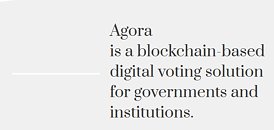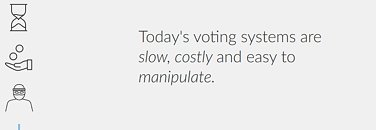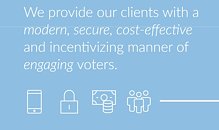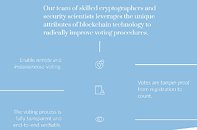Raevenlord
News Editor
- Joined
- Aug 12, 2016
- Messages
- 3,755 (1.23/day)
- Location
- Portugal
| System Name | The Ryzening |
|---|---|
| Processor | AMD Ryzen 9 5900X |
| Motherboard | MSI X570 MAG TOMAHAWK |
| Cooling | Lian Li Galahad 360mm AIO |
| Memory | 32 GB G.Skill Trident Z F4-3733 (4x 8 GB) |
| Video Card(s) | Gigabyte RTX 3070 Ti |
| Storage | Boot: Transcend MTE220S 2TB, Kintson A2000 1TB, Seagate Firewolf Pro 14 TB |
| Display(s) | Acer Nitro VG270UP (1440p 144 Hz IPS) |
| Case | Lian Li O11DX Dynamic White |
| Audio Device(s) | iFi Audio Zen DAC |
| Power Supply | Seasonic Focus+ 750 W |
| Mouse | Cooler Master Masterkeys Lite L |
| Keyboard | Cooler Master Masterkeys Lite L |
| Software | Windows 10 x64 |
Putting aside discussion of cryptocurrencies, bubbles, and the debated absence of intrinsic value, blockchain itself has a myriad of uses that are still in their exploration infancy. One such usage - one that was arguably first thought of by Philip K. Dick, albeit unknowingly - was the usage of such a system in voting, as a way to provide transparency and trust towards the system which (supposedly) materializes the will of the people.
When asked which country would be the first to implement a Blockchain-based election (which ran at 70% of the voting stations), Sierra Leone would likely be completely absent as an option. The country, which has a population of 7.4 million, has a known history of political and societal unrest, having seen multiple UN interventions in its (relatively) recent history. The company had no technological capacity to build such a blockchain-based voting system - and thus turned to an outside provider. Agora was the chosen company, which aimed to power Sierra Leone's presidential election through anonymously stored votes in an immutable ledger, thereby offering instant access to the election results. The wins come not only in counting speed and actual logistics and state spending improvements, though: the usage of blockchain obviously also ushers in transparency.



"Anonymized votes/ballots are being recorded on Agora's blockchain, which will be publicly available for any interested party to review, count and validate," said Leonardo Gammar, CEO of Agora. "This is the first time a government election is using blockchain technology." He added that "Sierra Leone wishes to create an environment of trust with the voters in a contentious election, especially looking at how the election will be publicly viewed post-election. By using blockchain as a means to immutably record ballots and results, the country hopes to create legitimacy around the election and reduce fall-out from opposition parties."



I must say I absolutely believe in blockchain technology's importance to bring the democratic system towards a modern, tamper-proof era that fully eliminates human error (and human dishonesty). As it has become clear that electronic voting systems based on typical electronic technology are hardly tamper proof and are susceptible to hacks by interested third parties, the usage of a decentralized, public network that uses the blockchain's Merkle tree systems sounds as the perfect solution. "If you believe that most countries will use some form of digital voting 50 years from now, then blockchain is the only technology that has been created which can provide an end-to-end verifiable and fully-transparent voting solution for this future," said Leonardo Gammar. Here's to that.
If you were curious regarding that Philip K. Dick reference, I've leafed through my short story collection to provide you this quote, from The Variable Man, and added a link to the Project Gutenberg copy:
"This gimmick makes it possible for citizens to raise and decide issues directly. They won't have to wait for the Council to verbalize a measure. Any citizen can transmit his will with one of these, make his needs register on a central control that automatically responds. When a large enough segment of the population wants a certain thing done, these little gadgets set up an active field that touches all the others. An issue won't have to go through a formal Council. The citizens can express their will long before any bunch of gray-haired old men could get around to it." Remove centralized and add a public ledger, and you've got the (currently) best possible use of a blockhain.

View at TechPowerUp Main Site
When asked which country would be the first to implement a Blockchain-based election (which ran at 70% of the voting stations), Sierra Leone would likely be completely absent as an option. The country, which has a population of 7.4 million, has a known history of political and societal unrest, having seen multiple UN interventions in its (relatively) recent history. The company had no technological capacity to build such a blockchain-based voting system - and thus turned to an outside provider. Agora was the chosen company, which aimed to power Sierra Leone's presidential election through anonymously stored votes in an immutable ledger, thereby offering instant access to the election results. The wins come not only in counting speed and actual logistics and state spending improvements, though: the usage of blockchain obviously also ushers in transparency.



"Anonymized votes/ballots are being recorded on Agora's blockchain, which will be publicly available for any interested party to review, count and validate," said Leonardo Gammar, CEO of Agora. "This is the first time a government election is using blockchain technology." He added that "Sierra Leone wishes to create an environment of trust with the voters in a contentious election, especially looking at how the election will be publicly viewed post-election. By using blockchain as a means to immutably record ballots and results, the country hopes to create legitimacy around the election and reduce fall-out from opposition parties."



I must say I absolutely believe in blockchain technology's importance to bring the democratic system towards a modern, tamper-proof era that fully eliminates human error (and human dishonesty). As it has become clear that electronic voting systems based on typical electronic technology are hardly tamper proof and are susceptible to hacks by interested third parties, the usage of a decentralized, public network that uses the blockchain's Merkle tree systems sounds as the perfect solution. "If you believe that most countries will use some form of digital voting 50 years from now, then blockchain is the only technology that has been created which can provide an end-to-end verifiable and fully-transparent voting solution for this future," said Leonardo Gammar. Here's to that.
If you were curious regarding that Philip K. Dick reference, I've leafed through my short story collection to provide you this quote, from The Variable Man, and added a link to the Project Gutenberg copy:
"This gimmick makes it possible for citizens to raise and decide issues directly. They won't have to wait for the Council to verbalize a measure. Any citizen can transmit his will with one of these, make his needs register on a central control that automatically responds. When a large enough segment of the population wants a certain thing done, these little gadgets set up an active field that touches all the others. An issue won't have to go through a formal Council. The citizens can express their will long before any bunch of gray-haired old men could get around to it." Remove centralized and add a public ledger, and you've got the (currently) best possible use of a blockhain.

View at TechPowerUp Main Site



